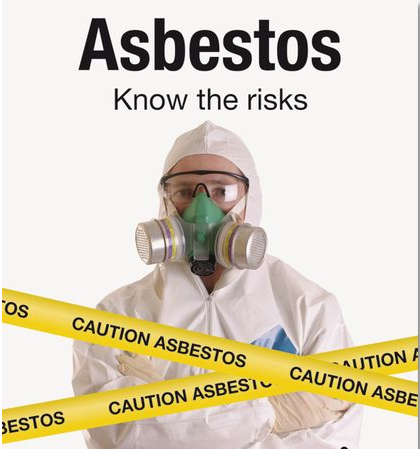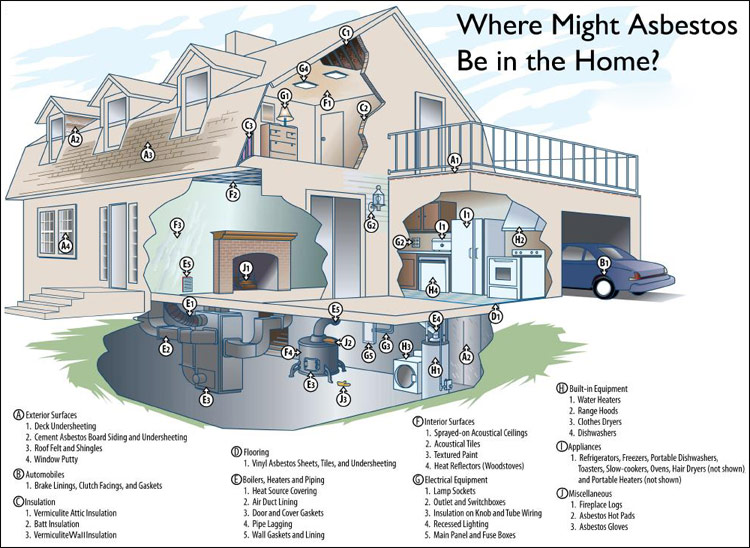WHY Should I Get An Asbestos Inspection in Georgia?

That’s a great question. First, it’s required by law. Second, it’s just a smart thing to do.
Asbestos is a serious threat to our health. It’s truly not just a bunch of hype and regulation. Around 15,000 deaths each year are attributed to asbestos related diseases. While long term exposure puts a person at higher risk, studies have shown that there is no “safe threshold” of exposure.
Asbestos fibers pose a threat when they are inhaled. To be inhaled, the material must be pulverized and turned to dust. That’s exactly what happens during demolition and renovation when you take a sledgehammer and crowbar to building materials. Properly handling asbestos is essential to keeping both the workforce and building occupants safe.
What Happens If Asbestos Is Found?
Finding asbestos in your project is an entirely manageable situation. Buildings that contain asbestos are safely renovated every day. It just takes a little more time and a little more money. If you have found asbestos in your project, start by calling a licensed asbestos contractor to discuss your next steps.
What Will The Inspector Check For?
Your asbestos inspector will start by discussing the project with you and determining the extent of demolition or renovation. From that conversation, they will identify any material that may be disturbed during the renovation that is suspected to contain asbestos.

Asbestos Inspection – Suspect Materials
Suspect materials include things like: joint compound, plaster, ceiling texture, vinyl flooring, window glaze, cement siding, pipe insulation, felt duct tape and more. Basically, if it is not wood, glass, metal, or ceramic, we have to presume it contains asbestos until a negative test shows otherwise.
After identifying all the suspect materials, your inspector will collect samples to be analyzed by the laboratory.
How Long Will It Take To Get Results?
After collecting samples, they will be sent to an accredited laboratory for analysis. These laboratory results are interpreted by the inspector. The inspector prepares a report that tells you what materials do or do not contain asbestos. This process generally takes about a 3 – 5 days. Results can be expedited as necessary.
What Will My Inspection Report Tell Me?
Your asbestos inspection report will show you all the areas of material that were found to contain asbestos. Any material that contains more than 1% asbestos fibers is then considered a Regulated Asbestos Containing Material.
It is important to note that the samples collected are only representative of the larger area. For example, your inspector may have collected joint compound samples from the living room & kitchen, but not the dining room. That does not mean that the dining room is negative. It just means that the inspector used samples from other areas to represent the larger space.
What Happens If Asbestos Is Found?
Finding asbestos in your project is an entirely manageable situation. Buildings that contain asbestos are safely renovated every day. It just takes a little more time and a little more money.
Please note that the State of Georgia Asbestos Program and the industry overall is subject to five regulations, and the most stringent regulation takes precedent in any given situation. The five regulatory references must include:
- GA Asbestos Removal & Encapsulation; 391-3-14;
- GA Solid Waste Rules – Asbestos; Chapter 391-3-4;
- AHERA 40 CFR Part 763 Subpart E;
- NESHAP 40 CFR Chapter 1 Subpart M 61.140; and
- OSHA 29 CFR 1926.1101.
The definition of Demolition is: The wrecking or removal of any load-supporting structural member of a facility, together with any related handling operations.
The definition of Renovation is: Altering a facility or one or more facility components in any way, including the stripping or removal of RACM from a facility component.
In an emergency, such as a water leak or sewer leak or structure damage, a restoration company is hired to remediate the emergency. This would include, but not be limited to, the immediate requirements of removing water, sewage, providing the structure with cover and security, adding air humidifiers to decrease moisture. The activities are limited to the immediate remediation of the emergency. That restoration contractor is not required to be an asbestos abatement firm. In an emergency, once the crisis is under control, all activities following are subject to asbestos abatement contractor requirements, regulations, protocols. The GA Asbestos Removal and Encapsulation Rules 391-3-14 and the GA Solid Waste Rules – Asbestos 391-3-4 would then apply.
Asbestos Inspection: There is not a line item for the requirement for asbestos inspection in the Georgia Asbestos Rules 391-3-14. However, GA EPD has adopted the federal NESHAP 40 CFR Chapter 1 subpart 61.140 which states that the owner or operator of a demolition or renovation activity, and prior to the commencement of the demolition or renovation, thoroughly inspect the affected facility or part of the facility where the demolition or renovation operation will occur for the presence of asbestos, including Category I and Category II non-friable ACM.
The Georgia Solid Waste Rule is really the rule that establishes the requirement for asbestos inspections in Georgia. It states that any solid waste over 1% asbestos content, must be properly packaged, labeled, transported, and disposed in a landfill that accepts asbestos. To comply with the rule, asbestos-containing material must be identified and properly handled. This means that any project, demolition or renovation, that will create solid waste in any quantity or type (friable or non-friable material) is subject to the Georgia Solid Waste Rule – Asbestos. An asbestos inspection is required.
The Georgia Project Notification for Asbestos Abatement, Encapsulation, and/or Renovation is required for any projects of 10SF/10LF of friable ACM, and on page 1 section 4, it has a question asking if asbestos is present. It also asks the name of the asbestos inspector and their credentials. This project notification is required for the abatement of the identified asbestos-containing material(s) and includes a fee and a waiting period of 10 days prior to the start of the abatement.
The Georgia Project Notification Form for Demolition is required for all demolitions in the State of Georgia, whether asbestos is identified and removed, or not found. It also asks if asbestos is present and the name and credentials of the inspector. There is a 10-day waiting period, prior to the start of the demolition, for this project notification as well.

